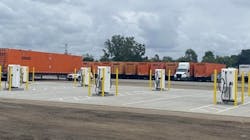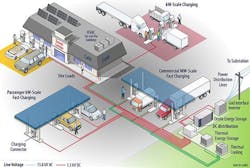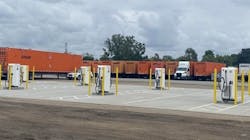A newly formed advocacy group points to a growing consensus that development of commercial electric vehicles (EVs) and associated charging infrastructure now demands a concerted, focused, all-hands-on-deck approach.
Three truck manufacturers getting more heavily invested in building battery-powered medium- and heavy-duty trucks recently joined forces to form Powering America’s Commercial Transportation (PACT).
Supported by a range of other interests — including electrical engineering leader Burns & McDonnell, charging station developers like WattEV, and charging equipment maker ABB — PACT will guide efforts to identify and break down barriers to a coordinated build-out of the supports needed to put steadily more electric commercial vehicles on American roads. Founding companies Daimler Truck North America, Navistar, and Volvo Group North America make 70% of new electric trucks for the U.S. market but worry growth will hit a ceiling unless a robust charging infrastructure is put in place.
A growing challenge for commercial EV interests may be avoiding getting drawn into the vexing issue of growing the country’s light-duty (passenger car) EV market. After an initial spurt, demand for EVs has been flagging lately amidst continued challenges in getting reliable charging stations in place and reluctance of a second wave of potential buyers beyond early adopters to pay a steep premium for EVs. While developments in that sphere bear watching, that market has very different dynamics than the one for medium/heavy-duty (MHD) vehicles, including charging capabilities, utilization, economics, and siting.
“So far in the United States, transportation electrification has largely focused on the needs of light-duty passenger vehicles, a far different market segment that does not require the same unique considerations as M/HDs,” according to PACT’s announcement press release. “Quickly deploying reliable and accessible zero-energy vehicle (ZEV) infrastructure to power the nation’s commercial transportation fleet necessitates distinct considerations for capital investment, electrical grid upgrades, and dedicated charging equipment.”
One overarching challenge the group will tackle is readying the nation’s electric grid to handle the enormous power draw truck charging will demand. National Renewable Energy Labs (NREL) is contributing to research in that area, envisioning creation of a new megawatt charging system that would underlie state-of-the-art truck charging stations of the future (see Figure).
Calling its stakeholders truck makers, commercial fleets, charging infrastructure developers, utilities, policymakers, and regulators, the group says its aim is to clear the path to realizing the full potential of battery-powered trucks, balancing the interests of the parties and staying agnostic on the particulars of solutions. Moving ahead on commercial vehicle electrification is vital, it says, for energy conservation and the health of the climate and a broad economy that is heavily reliant on efficient transportation.
"Decarbonizing the commercial transportation sector — the fleets that keep America moving — is critical to meeting our nation’s climate goals. But the transition to zero-emission vehicles is stalling without the deployment of the needed charging infrastructure,” said John O'Leary, president and CEO of Daimler Truck North America. “Through PACT, we aim to accelerate this infrastructure buildout so that fleets can adopt ZEVs at scale, and we can all benefit from impactful emissions reductions as quickly as possible."
The new organization takes shape even as myriad joint ventures, often headed by fleet operations, build and open commercial truck charging sites. Some are opening under the guise of small-scale testing of charging concepts, technologies. and configurations, while others aim to serve a paying commercial market.
One of the newest is a 6MW site in El Monte, Calif., for fleet operator Schneider International. Installed by engineering firm Black & Veatch, the charging depot’s 16 charging stations can power 32 heavy-duty electric trucks simultaneously. According to a Spectrum News 1 story, the station and trucks were partially funded through a California climate protection program, the Joint Electric Truck Scaling Initiative.
Another new project comes through Terawatt Infrastructure. The San Francisco company is building a truck stop-like facility near downtown Los Angeles that will open in 2025 with 10MW charging capacity, 21 charging stalls, and driver amenities. While that existing site is being built out, its 450kW charging capacity will function in a temporary capacity servicing fleets looking to easily access fast charging for their battery-powered trucks. Terawatt also announced plans to open four other truck charging facilities in California in 2024.
About the Author
Tom Zind
Freelance Writer
Zind is a freelance writer based in Lee’s Summit, Mo. He can be reached at [email protected].


